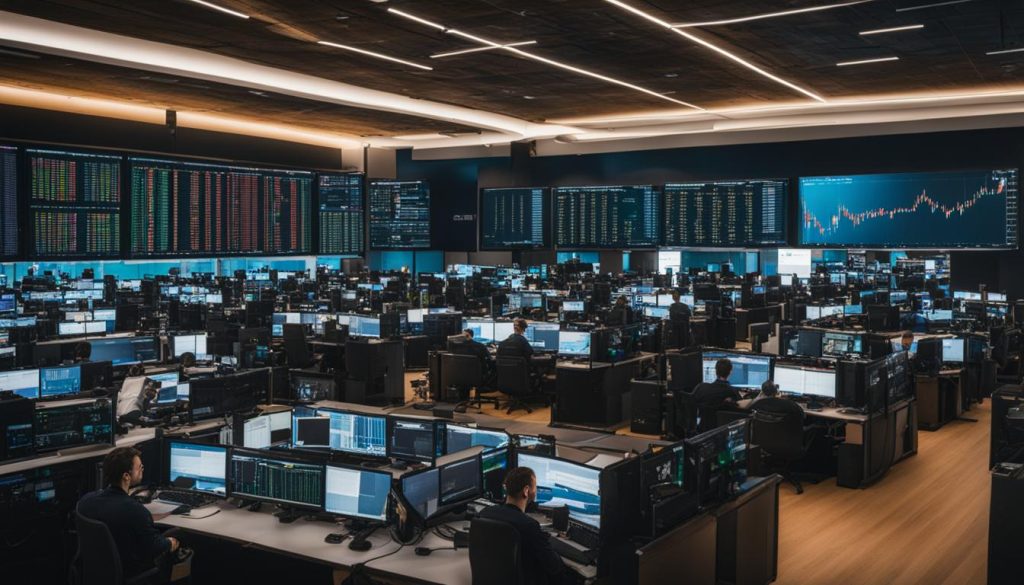Welcome to our comprehensive guide on centralized crypto exchanges, where we will take you through the world of digital currency trading platforms. Whether you are a beginner looking to enter the cryptocurrency market or an experienced trader seeking to expand your knowledge, this guide aims to provide you with a comprehensive understanding of centralized exchanges and empower you to make informed decisions.
Key Takeaways:
- Centralized crypto exchanges play a pivotal role in the world of digital currencies, providing platforms for users to buy, sell, and trade cryptocurrencies.
- They offer high liquidity, a wide range of listed cryptocurrencies, and user-friendly interfaces.
- However, they also have disadvantages such as counterparty risk and potential regulatory risks.
- When choosing an exchange, consider factors like the number of available crypto pairs, security measures, and user-friendly interface.
- It’s important to understand the key features and functionality of centralized exchanges to make informed decisions.
Understanding Centralized Cryptocurrency Exchanges
Centralized cryptocurrency exchanges are an essential component of the digital currency ecosystem. They provide a platform for users to buy, sell, and trade cryptocurrencies with ease. To understand how these exchanges work and the features they offer, let’s take a closer look at order matching, user accounts, and the deposit and withdrawal of funds.
Order Matching
Order matching is a crucial function of centralized exchanges. When you place a buy or sell order, the exchange’s order matching engine matches it with an opposing order from another user. This ensures that the trade is executed at the desired price. The order book displays all open orders, allowing users to monitor market activity and make informed decisions.
User Accounts
In order to use a centralized exchange, you will need to create a user account. This process typically involves providing personal information for identification purposes, such as your name, email address, and sometimes even a government-issued ID. User accounts are essential for maintaining the security and integrity of the exchange platform.
Deposit and Withdrawal of Funds
Once you have a user account, you can deposit funds into your exchange wallet. This allows you to have a balance that you can use to place buy orders or trade with other users. Similarly, when you want to withdraw funds, you can transfer them from your exchange wallet to an external wallet of your choice. It’s important to note that each exchange may have different policies and fees regarding deposits and withdrawals.
Understanding the basic functionalities and processes of centralized exchanges is crucial for anyone interested in participating in cryptocurrency trading. By grasping the concepts of order matching, user accounts, and the deposit and withdrawal of funds, you can navigate these platforms effectively and make informed decisions.

| Key Features | Functionality |
|---|---|
| Order Matching | Matching buy and sell orders to execute trades |
| User Accounts | Creation of accounts for users to access exchange services |
| Deposit and Withdrawal of Funds | Moving funds into and out of exchange wallets |
Advantages of Centralized Cryptocurrency Exchanges
Centralized cryptocurrency exchanges offer several advantages that make them popular among traders in the digital currency market. Understanding these benefits will help you make informed decisions when choosing an exchange. Here are the key advantages of centralized exchanges:
High Liquidity
One of the significant advantages of centralized exchanges is their high liquidity. Liquidity refers to the ability to buy or sell an asset quickly and at a fair price without causing significant price fluctuations. Centralized exchanges attract a large number of buyers and sellers, creating a vibrant trading environment. This high liquidity ensures that you can easily execute your trades and find counterparties for your orders.
Wide Range of Listed Cryptocurrencies
Another advantage of centralized exchanges is the wide range of cryptocurrencies listed on their platforms. These exchanges typically support a diverse selection of digital currencies, including popular ones like Bitcoin and Ethereum, as well as lesser-known altcoins. This variety allows you to explore different investment opportunities and diversify your portfolio. Whether you are interested in well-established coins or emerging projects, centralized exchanges provide a vast array of options.
User-Friendly Interfaces and Features
Centralized exchanges prioritize user experience by providing intuitive and user-friendly interfaces. They offer features such as real-time price charts, order books, and trading tools that facilitate efficient trading. These platforms are designed to be accessible even to beginners, allowing users to navigate the exchange effortlessly. Whether you are placing a market order, setting limit orders, or analyzing price trends, centralized exchanges offer tools and interfaces that make the trading process straightforward.
Overall, centralized cryptocurrency exchanges offer high liquidity, a wide range of listed cryptocurrencies, and user-friendly interfaces and features. These advantages make them attractive options for traders seeking convenience and accessibility in the digital currency market.

Disadvantages of Centralized Cryptocurrency Exchanges
While centralized cryptocurrency exchanges offer convenience and a wide range of features, they also come with several disadvantages that users should be aware of.
Centralization and Counterparty Risk
A key disadvantage of centralized exchanges is the centralization of power and control. When using these exchanges, users must trust the platform to securely hold and manage their assets. This introduces counterparty risk, as users are reliant on the exchange’s security measures and operational integrity. In the event of a security breach or a hack, users’ funds can be at risk, resulting in potential financial loss. This risk is amplified when users store their cryptocurrencies in exchange-owned wallets instead of personal wallets.
Lack of Anonymity and Privacy
Another drawback of centralized exchanges is the lack of anonymity and privacy. As part of the onboarding process, users are required to provide personal information for identity verification purposes. This compromises the anonymous nature of cryptocurrencies, as transactions and user identities can be tied back to real-world individuals. This lack of privacy can be a concern for individuals who value the anonymity that cryptocurrencies can offer.
Potential Regulatory and Legal Risks
Centralized exchanges also face potential regulatory and legal risks. As governments around the world continue to develop regulations for cryptocurrencies, exchanges may face increased scrutiny and be subject to compliance requirements. Any changes in regulations or legal uncertainties can impact the operations of centralized exchanges, leading to disruptions in trading or even the closure of certain exchanges. This regulatory uncertainty can create a level of instability in the cryptocurrency market and pose risks to users’ funds.
| Disadvantages of Centralized Cryptocurrency Exchanges: |
|---|
| Centralization and Counterparty Risk |
| Lack of Anonymity and Privacy |
| Potential Regulatory and Legal Risks |
It’s important for users to carefully consider these disadvantages before engaging in activities on centralized exchanges. Understanding the risks associated with centralization, lack of anonymity, and potential regulatory hurdles can help users make informed decisions and take necessary precautions to protect their investments in the cryptocurrency market.

Key Features and Functionality of Centralized Cryptocurrency Exchanges
When it comes to using centralized cryptocurrency exchanges, there are several key features and functionalities to be aware of. These features play a crucial role in facilitating account creation, deposit and withdrawal of funds, and order placement.
Account Creation
Before you can start trading on a centralized exchange, you will need to create an account. This typically involves providing personal information such as your name, email address, and sometimes even a form of identification for verification purposes.
Deposit and Withdrawal of Funds
Once your account is created, you can deposit funds into your exchange wallet. This can usually be done through various methods such as bank transfers, credit/debit cards, or even other cryptocurrencies. Similarly, when you want to withdraw funds from the exchange, you can initiate a withdrawal request and transfer the funds back to your personal wallet.
Order Placement
Order placement is a fundamental aspect of centralized exchanges. You can place different types of orders, such as market orders, limit orders, or stop orders, depending on your trading strategy. Market orders allow you to buy or sell at the current market price, while limit orders allow you to set a specific price at which you want to buy or sell. Stop orders, on the other hand, are used to trigger a buy or sell order once the price reaches a certain level.
Being familiar with these key features and functionalities of centralized exchanges will help you navigate the trading process effectively and make informed decisions when it comes to managing your funds.

| Key Features | Functionality |
|---|---|
| Account Creation | Allows users to create an account on the exchange by providing personal information. |
| Deposit and Withdrawal of Funds | Enables users to deposit funds into their exchange wallet and withdraw funds to their personal wallets. |
| Order Placement | Allows users to place different types of orders, such as market orders, limit orders, and stop orders. |
Centralized vs Decentralized Exchanges: Which is better?
When it comes to cryptocurrency exchanges, you have two main options: centralized exchanges and decentralized exchanges. Both have their own advantages and disadvantages, and the choice between the two depends on your priorities and preferences. Let’s take a closer look at the key factors to consider when comparing centralized and decentralized exchanges.
Trust and Control
In a centralized exchange, you need to trust the platform to handle your funds securely and fairly. The exchange acts as an intermediary, holding your assets and executing trades on your behalf. While this centralized structure provides regulatory oversight and better performance, it also means you have less control over your funds.
On the other hand, decentralized exchanges operate on blockchain technology and eliminate the need for intermediaries. This gives users full control over their funds and eliminates the risk of a single point of failure. However, decentralized exchanges may lack the same level of regulatory compliance and user protections as centralized exchanges.
Liquidity and Trading Options
Centralized exchanges generally offer higher liquidity compared to decentralized exchanges. With a larger user base and centralized order books, centralized exchanges can provide quick and efficient trade execution. Additionally, centralized exchanges often support a wide range of trading pairs and offer advanced trading features.
Decentralized exchanges, on the other hand, may have lower liquidity due to their distributed nature. However, they offer the advantage of a wider range of supported cryptocurrencies, including newer and less well-known tokens. Decentralized exchanges also provide users with more privacy and anonymity in their trading activities.
| Centralized Exchanges | Decentralized Exchanges | |
|---|---|---|
| Liquidity | High | Variable |
| Control | Less | Full |
| Regulation | Yes | Varies |
| Trading Options | Wide range | Varies |
“Centralized exchanges provide the advantage of regulatory oversight and better liquidity, making them suitable for traders who prioritize speed and accessibility. Decentralized exchanges offer more control and privacy, catering to those who value the ideals of blockchain technology.”
In conclusion, the choice between centralized and decentralized exchanges ultimately depends on your specific requirements. If you prioritize trust, regulation, and a wide range of trading options, centralized exchanges may be the better choice for you. However, if you value control, privacy, and the principles of decentralization, decentralized exchanges provide a viable alternative. Consider your trading preferences and priorities to make an informed decision that aligns with your goals.

Working of Centralized Exchanges
Centralized cryptocurrency exchanges play a crucial role in facilitating the buying, selling, and trading of digital currencies. Understanding how these exchanges work is essential for users looking to navigate the cryptocurrency market effectively.
One key aspect of centralized exchanges is order matching. When a user places a buy or sell order, the exchange matches it with a corresponding order from another user in the order book. This process ensures that transactions are executed efficiently and at the best available price.
Additionally, centralized exchanges act as custodians of user funds. When users deposit their cryptocurrencies onto the exchange, the platform holds and manages these assets on their behalf. This role as a custodian ensures the security and integrity of users’ funds, providing a level of trust and reliability to the trading process.
Furthermore, centralized exchanges comply with regulations such as Know Your Customer (KYC) and anti-money laundering protocols. These compliance measures are in place to verify the identity of users and prevent illicit activities, ensuring a safe and secure trading environment.
| Key Points | Working of Centralized Exchanges |
|---|---|
| Order Matching | Exchange matches buy and sell orders from users. |
| Role as Custodian | Exchanges hold and manage user funds. |
| Compliance with Regulations | Exchanges adhere to KYC and anti-money laundering protocols. |
Advantages of Centralized Exchanges in Comparison to DEXs
When it comes to choosing a cryptocurrency exchange, it’s important to consider the advantages of centralized exchanges in comparison to decentralized exchanges (DEXs). While both types of exchanges have their own benefits, centralized exchanges offer unique features that make them a popular choice for many traders.
Regulations and Safety
One of the key advantages of centralized exchanges is the presence of regulations and safety measures. Centralized exchanges are typically subject to government regulations and must comply with Know Your Customer (KYC) and anti-money laundering (AML) protocols. These regulatory requirements help to ensure that the exchange is operating in a transparent and secure manner, providing users with a sense of trust and confidence. Additionally, centralized exchanges often have robust security measures in place to protect user funds, such as cold storage and two-factor authentication.
Market Makers and Liquidity
Centralized exchanges also act as market makers, contributing to the liquidity of the platform. Liquidity refers to the ability to buy or sell an asset quickly and at a stable price. With a centralized exchange, there is typically a large pool of buyers and sellers, resulting in high liquidity. This means that users can easily enter or exit positions without experiencing significant price slippage. In contrast, DEXs may have lower liquidity due to their decentralized nature, which can result in higher trading costs and less favorable execution prices.
User-Friendly Experience
Centralized exchanges are known for their user-friendly interfaces and features, making them accessible to traders of all levels of experience. These platforms often provide intuitive trading charts, order books, and trading tools that enable users to navigate the market effectively. Additionally, centralized exchanges may offer advanced features such as margin trading and lending, providing users with opportunities to enhance their trading strategies. The user-friendly experience of centralized exchanges makes them an attractive choice for both beginner and experienced traders alike.
| Advantages of Centralized Exchanges | Advantages of DEXs |
|---|---|
| Regulations and safety measures | User control and privacy |
| Market makers and high liquidity | No central point of failure |
| User-friendly interfaces and features | Lower fees |
Overall, centralized exchanges provide a regulated and secure trading environment, market liquidity, and user-friendly experiences, making them a preferred choice for many cryptocurrency traders. While DEXs offer unique advantages such as user control and lower fees, the advantages of centralized exchanges make them a popular and reliable option for those looking to engage in digital asset trading.
How to Choose a Crypto Exchange
When it comes to choosing a crypto exchange, there are several factors you need to consider to ensure you find the right platform for your needs. Here are three key aspects to keep in mind:
Number of Crypto Pairs
One of the first things to consider is the number of crypto pairs available on the exchange. A diverse range of crypto pairs allows for more trading options and flexibility in your investment strategies. Look for an exchange that offers a wide selection of popular cryptocurrencies as well as potentially emerging coins.
Security Measures
Security should be a top priority when choosing a crypto exchange. Ensure that the platform has robust security measures in place to protect your funds and personal information. Look for exchanges that offer features such as two-factor authentication, cold storage for user funds, and regular security audits.
User-Friendly Interface
A user-friendly interface can make a significant difference in your overall trading experience. Choose an exchange that provides an intuitive and easy-to-navigate interface. Look for features such as real-time price charts, order placement options, and a clear and concise dashboard. A user-friendly interface will help you execute trades more efficiently and effectively.
By considering these factors, you can find a crypto exchange that meets your requirements in terms of available crypto pairs, security measures, and a user-friendly interface. Take the time to research and compare different exchanges before making a decision, as finding the right platform is essential for a successful trading experience.

Conclusion
Centralized crypto exchanges are vital components in the digital currency world, providing you with platforms to buy, sell, and trade cryptocurrencies. These exchanges offer numerous benefits such as high liquidity, a wide selection of listed cryptocurrencies, and user-friendly interfaces. However, it is crucial to be aware of their drawbacks, including counterparty risk and potential regulatory uncertainties.
When choosing a crypto trading platform, it is essential to understand the key features and functionalities of centralized exchanges. Consider factors such as the number of available crypto pairs, security measures, and a user-friendly interface to meet your specific needs. Whether you opt for a centralized or decentralized exchange, thorough research is necessary to select a platform that aligns with your requirements.
Decentralized exchanges also play a significant role in the crypto market, offering benefits such as user control and lower fees. However, each type of exchange appeals to different types of traders, highlighting the importance of understanding your preferences and trading style.
Regardless of your choice, centralized crypto exchanges and decentralized exchanges provide opportunities to participate in the dynamic world of cryptocurrencies. Keep yourself informed and make well-informed decisions that align with your goals and risk appetite.
FAQ
What are centralized cryptocurrency exchanges?
Centralized cryptocurrency exchanges are online platforms that act as intermediaries for users to buy, sell, and trade digital currencies.
How do centralized exchanges match buy and sell orders?
Centralized exchanges use order books to match buy and sell orders from users.
What information do users need to provide to use centralized exchanges?
Users need to create an account and provide personal information for identification purposes.
How do users deposit and withdraw funds on centralized exchanges?
Users can deposit funds into their exchange accounts and withdraw funds to external wallets.
What are the advantages of centralized cryptocurrency exchanges?
Centralized exchanges offer high liquidity, a wide range of listed cryptocurrencies, and user-friendly interfaces and features.
What risks are associated with centralized cryptocurrency exchanges?
Centralized exchanges introduce counterparty risk and compromise user anonymity. They are also subject to potential regulatory changes and legal uncertainties.
How do users navigate centralized cryptocurrency exchanges?
Users need to create an account, deposit funds, and place buy or sell orders. These exchanges support various deposit methods and offer user-friendly interfaces for easy navigation.
What are the key differences between centralized and decentralized exchanges?
Centralized exchanges offer regulations and better performance, while decentralized exchanges provide user control and lower fees.
What role do centralized exchanges play in order matching?
Centralized exchanges match buy and sell orders through order matching and act as custodians of user data.
How do centralized exchanges ensure safety and provide regulations?
Centralized exchanges offer safety measures, comply with regulations such as Know Your Customer (KYC), and act as market makers, providing liquidity.
What factors should be considered when choosing a crypto exchange?
Consider the number of available crypto pairs, security measures implemented, and user-friendly interface when choosing a crypto exchange.
What is the role of centralized crypto exchanges in the digital currency world?
Centralized crypto exchanges play a crucial role in providing platforms for users to buy, sell, and trade cryptocurrencies, offering benefits such as high liquidity and a wide range of listed cryptocurrencies.

